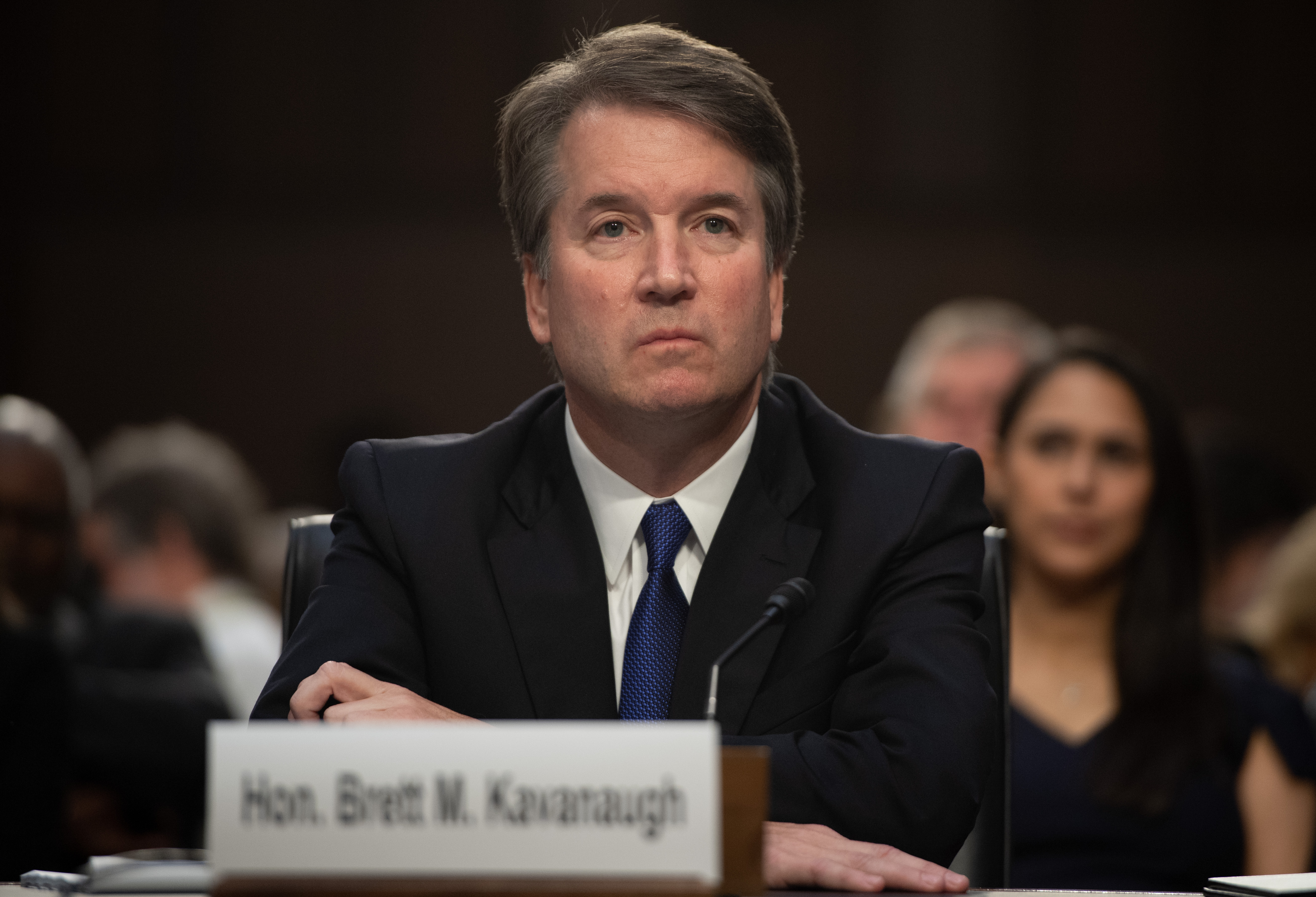Supreme Court pick Kavanaugh: Bush loyalist, conservative stalwart
Judge Brett Kavanaugh faces US Senators at a hearing on whether to confirm his appointment to a liftetime seat on the US Supreme Court
(SAUL LOEB)
Washington (AFP) – Brett Kavanaugh, Donald Trump’s choice to fill a crucial Supreme Court vacancy, is a conservative appellate court judge who has staunchly defended the executive power of the presidency and describes himself as a strict adherent to the US Constitution.
The huge stakes and fierce passions aroused by the lifetime appointment were on display Tuesday as shouts of protests and Democratic demands for a postponement greeted the start of his Senate confirmation hearing.
The 53-year-old Kavanaugh, no stranger to Washington politics, sat stone-faced throughout.
If confirmed as the Supreme Court’s ninth justice, he is likely to tilt an already conservative high court even more reliably to the right.
Under intense scrutiny are his decisions over the past 11 years as a judge on the US Court of Appeals in Washington, as well as his previous roles as a legal adviser to former president George W. Bush and a participant in a special counsel probe that led to the impeachment of former president Bill Clinton.
Democrats have protested the White House’s withholding of 100,000 pages of documents related to his years in the Bush White House. Republicans counter that they have already received more than 400,000 pages of Kavanaugh-related documents.
“There is no one in America more qualified for this position and no one more deserving,” Trump said in announcing his nomination at the White House.
Kavanaugh began his career as a clerk to Anthony Kennedy, the justice long considered a critical swing vote on the Supreme Court, and will succeed him on the bench if confirmed.
“Justice Kennedy devoted his career to securing liberty. I am deeply honored to be nominated to fill his seat on the Supreme Court,” Kavanaugh said as Trump announced his nomination at the White House July 9.
“My judicial philosophy is straightforward. A judge must be independent and must interpret the law, not make the law,” he said.
A Yale University graduate, in the 1990s he led an investigation into the suicide of Bill Clinton aide Vince Foster, who was linked to the Whitewater controversy that began as a probe into the presidential couple’s real estate investments.
Kavanaugh later contributed to prosecutor Kenneth Starr’s report into Clinton’s affair with White House intern Monica Lewinsky, and which outlined several grounds for Clinton’s impeachment.
Later he was part of George Bush’s legal team in working on the 2000 Florida recount, which resulted in Bush winning the presidency.
– Ammunition for opponents –
After Bush moved into the White House in 2001, he recruited Kavanaugh as legal counsel before later naming him to the appellate court in 2003.
But Kavanaugh’s nomination languished for three years, as Democrats fumed over his participation in Bush’s recount team. He was eventually confirmed in 2006.
In 2012, Kavanaugh was part of a panel that scrapped an Environmental Protection Agency measure aimed at reducing air pollution in the United States.
He recently voiced disagreement with a court decision allowing a teenage unauthorized immigrant to get an abortion.
A practicing Catholic active in various religious organizations, Kavanaugh is a married father of two girls.
Some Republicans have expressed concern that Kavanaugh’s extensive record on various critical cases could give ammunition for opponents to delay the confirmation process or scuttle the nomination.
Lawyers who had argued cases in front of Kavanaugh recalled him as an active questioner from the bench, and a very well prepared jurist who would fit in on a Supreme Court whose justices are largely not shy in oral arguments with advocates.
While Kavanaugh’s record has antagonized conservatives at times, his position on executive authority may have endeared him to Trump.
With the president facing a sweeping investigation by Special Counsel Robert Mueller, it may have appealed to him to nominate a justice who has argued that the commander in chief should be shielded from criminal prosecution while in office.
In the Minnesota Law Review, Kavanaugh argued that while the nation requires a check against “a bad-behaving or law-breaking president,” that check is provided only by the US Constitution.
“If the President does something dastardly, the impeachment process is available,” Kavanaugh wrote. “No single prosecutor, judge, or jury should be able to accomplish what the Constitution assigns to the Congress.”
Disclaimer: This story has not been edited by Siliconeer and is published from a syndicated feed. Siliconeer does not assume any liability for the above story. Validity of the above story is for 7 Days from original date of publishing. Content copyright AFP.


